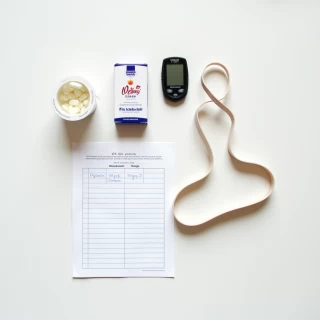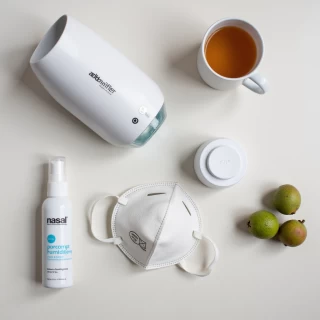
- 20th November 2025
Table of Contents
- Your Smog-Season GERD Routine: Night, Morning, Meals, and Daily Habits
- F) The Combined Night + Morning Routine
- 1) Night Routine: The Most Important Step to Prevent Morning Acidity
- 2) Morning Routine (First 60–90 Minutes): Your “Reset Window”
- G) Smog-Safe “Morning Acidity” Breakfast Options for Delhi–NCR
- H) Tea, Coffee, and Herbal Drinks: What Works and What Hurts in Smog Season
- I) Office Routine for Smog Season: GERD & Airway Safe
- J) Senior Routine: Special Considerations in Smog + GERD
- Mistakes, Tests, Checklists, and Final Action Plan
Every winter in Delhi–NCR, I see a very specific pattern in my clinic. Patients come and say, “Doctor, I wake up with terrible acidity,” “My throat burns in the morning,” or “I feel gas and tightness in my chest as soon as I get out of bed.” Many of them already know they have acidity or Gastroesophageal Reflux Disease (GERD). But during smog season, their symptoms change – they become more frequent, more intense, and more confusing.
On one side, we have polluted winter air with very high PM2.5 levels. On the other side, we have our stomach and food pipe (esophagus) dealing with late dinners, more tea and coffee, and slower winter digestion. The two systems – lungs and digestive tract – may look separate, but in real life they interact through shared nerves, inflammation, sleep, posture, and breathing patterns.
For general adults, office workers, seniors, and people with existing acidity, this combination becomes a double hit. The air irritates the airways, and the lifestyle around smog season (less activity, disturbed sleep, comfort eating, extra caffeine) worsens GERD. The result is very typical: heaviness, burning, sour taste, cough, throat irritation, or chest tightness early in the morning.
A) What Is Actually Happening When You Wake Up With “Morning Acidity”?
When patients say “acidity,” they could be experiencing different but related problems. Clinically, in smog-season mornings around Delhi–NCR, I commonly see three overlapping patterns:
- Classic GERD: Acid from the stomach flows back into the food pipe, especially at night, causing burning in the chest or throat, sour taste, and sometimes regurgitation.
- Upper airway irritation from pollution: Smog irritates the nose, throat, and upper airway, leading to cough, throat clearing, and a heavy chest – which can be mistaken for “gas” or “acidity.”
- A mixed picture: Both reflux and airway irritation are present, making it difficult for patients to separate “lung symptoms” from “gastric symptoms.”
At night, when you lie down, gravity no longer helps keep acid in the stomach. If the lower esophageal sphincter (LES – the valve between your food pipe and stomach) is weak or relaxed, acid can more easily move upward. If you had a late, heavy, or oily dinner, your stomach is still processing food when you go to bed. Add poor sleep, pollution-related nasal congestion, or mouth breathing, and you get a perfect setup for morning discomfort.
This is why people with GERD often describe mornings like this: burning behind the breastbone, sore throat, sour fluid in the mouth, bitter taste, sinus heaviness, or “gas travelling to the chest.”
B) How Smog Season Changes Your Routine And Aggravates GERD
Smog does not just sit outside in the air; it quietly reshapes your daily habits. These habit changes are very important for GERD.
- Less outdoor movement: People avoid morning walks because of poor AQI. This reduces overall activity and slows digestion.
- More screen time indoors: Late-night OTT shows, phones, or work on laptops push dinner time later and disturb sleep.
- Extra tea and coffee: To feel awake and “clear the head,” many adults increase caffeine, which weakens the LES and increases acid.
- Heavier comfort foods: Fried snacks, rich gravies, sweets, and late-night snacks become more common, especially after long office days.
- Closed rooms with heaters: Dry, warm air indoors irritates the throat and makes any small reflux feel more intense.
So even without thinking about PM2.5 and PM10 directly, the smog season lifestyle itself is very GERD-unfriendly – particularly for sedentary office workers and seniors who already have slower digestion and reduced mobility.
C) Smog Exposure vs GERD Triggers: How Each One Affects Morning Acidity
To understand morning symptoms clearly, it helps to separate what is mainly driven by air quality and what is driven by reflux, even though they often interact. This padded comparison table gives you a practical way to think about it.
Smog Exposure vs GERD Triggers – Impact on Morning Acidity
For many Delhi–NCR patients, both columns are active at the same time. That is why they may say, “Sometimes I feel it is gas, sometimes it feels like my lungs,” and they are not wrong – the body is dealing with both airway irritation and reflux.
D) Why Morning Is the Worst Time For Many GERD Patients in Smog Season
If you are an office-going adult, senior, or someone already diagnosed with GERD, smog-season mornings can feel particularly harsh. There are several reasons for this timing.
- Overnight pooling of acid: When you lie flat, small amounts of acid can keep irritating the lower food pipe. A weak LES or large late-night meal makes this more likely.
- No water intake for many hours: During sleep, acid is not being neutralised or washed down by sips of water. On waking, the lining is more sensitive.
- Dry, polluted air inside the bedroom: Heaters, closed windows, or poor filtration make the throat and airways more inflamed and dry.
- Stress about the day ahead: Many professionals wake up already mentally “switched on,” which increases stress hormones and gut sensitivity.
- Delayed or skipped breakfast: Some people only drink tea on an empty stomach in the morning, increasing acid and reflux risk.
In practical terms, this means that the first one to two hours after waking become a “high-risk window” for symptoms. Patients report burning, nausea, mucus in the throat, cough, chest tightness, light-headedness, and a feeling that the day has started on a wrong note.
E) Who Is Most Vulnerable in Delhi–NCR During Smog Season?
In my practice, I notice that certain groups are more likely to struggle with morning acidity when air quality is poor:
- People with known GERD or chronic acidity: Their LES is already sensitive; smog-season habits push it over the edge.
- Sedentary office workers: Long sitting hours, late dinners, and high caffeine intake are very common in this group.
- Seniors: Slower digestion, more medicines, and weaker muscle tone around the LES make reflux easier.
- People with asthma, COPD, or chronic bronchitis: Airway diseases make them more sensitive to pollution; reflux can worsen cough and breathlessness further.
- People with irregular shifts or late-night work: BPO staff, IT professionals, and people on rotating shifts have disturbed sleep patterns that worsen GERD.
For these groups, controlling only food or only pollution is usually not enough. They need a combined approach: better GERD hygiene plus smarter smog-season habits.
Your Smog-Season GERD Routine: Night, Morning, Meals, and Daily Habits
Now that you understand why Delhi’s smog season strongly amplifies morning acidity, it is time to fix the pattern from the root. Morning acidity is not created in the morning — it is created the previous night. Similarly, your first 60–90 minutes after waking decide whether your day stays stable or becomes a cycle of burning, heaviness, cough, and discomfort.
In this section, I will give you a structured routine designed for general adults, office workers, seniors, and people with GERD. All steps are winter-friendly, Delhi-specific, and practical for real life.
F) The Combined Night + Morning Routine
1) Night Routine: The Most Important Step to Prevent Morning Acidity
In smog season, your night routine decides at least 50–60 percent of your morning GERD intensity. Poor sleep, late dinners, heated rooms, and nasal congestion create the perfect storm for reflux.
- Finish dinner between 7:45 and 8:30 pm. This is the single most effective action for most adults in Delhi–NCR.
- Keep dinner light and non-greasy. Prefer khichdi, oats upma, dal + sabzi + 1 phulka, or thick soups with soft carbs.
- Avoid fried foods at night: samosas, bhajiyas, momos, paratha-bhujia, paneer-heavy gravies.
- Stay upright for 35–45 minutes after eating. Do not lie down immediately or recline on the sofa.
- Breathing clean air indoors: Use an air purifier in the bedroom if possible, especially for seniors or GERD + asthma patients.
- Head elevation helps: If night reflux is frequent, elevate the head side of the bed by 4–6 inches. Do not use extra pillows under the neck.
- No screens for 60 minutes before sleep. Blue light and mental stimulation increase reflux sensitivity.
- Keep the room slightly warm, not hot. Heaters make air dry, which intensifies throat burning from even small reflux episodes.
- Nasal care if congested: Steam before bed or saline nasal rinse reduces mouth breathing, lowering morning throat irritation.
2) Morning Routine (First 60–90 Minutes): Your “Reset Window”
Most patients wake up with dryness, irritation, heaviness, or burning because of the combined effect of smog + reflux + long fasting hours. The first 90 minutes should focus on rehydration, warming the gut gently, and reducing throat irritation.
- Start with 150–200 ml warm water — slowly, not in one gulp. This dilutes acidic residue and moisturizes the throat.
- Avoid tea or coffee for the first 30–40 minutes. Caffeine on an empty stomach worsens acidity and can cause palpitations in smog season.
- Open windows only briefly if AQI is high. If AQI is severe, avoid ventilation during peak smog hours (5–10 am).
- Deep breathing (2 minutes) facing away from the window: Focus on nasal breathing only. This calms the vagus nerve and stabilizes GERD.
- Gargle with warm saline if throat feels irritated. Pollution dries and irritates the upper airway, which exaggerates reflux symptoms.
- Eat a warm, soft breakfast within 45–60 minutes of waking. Long fasting with only tea is one of the biggest morning acidity triggers.
- If going for a walk: Prefer late morning after 10 am when AQI improves slightly. Avoid early-morning cold walks during smog season.
- Avoid spicy chutneys and pickles in breakfast. These irritate the esophageal lining, which is already inflamed.
G) Smog-Safe “Morning Acidity” Breakfast Options for Delhi–NCR
Breakfast should be warm, soft, and low on irritants. During smog season, your esophageal lining and throat are more sensitive because of dryness and pollutants. These options are gentle on digestion and reduce morning burning and heaviness.
H) Tea, Coffee, and Herbal Drinks: What Works and What Hurts in Smog Season
This is where most people unknowingly worsen morning acidity. The habit of drinking chai immediately after waking, especially on an empty stomach, causes a sudden acid spike.
- Delay tea/coffee by 30–45 minutes after waking.
- Limit total cups to two per day, the second before 3 pm.
- Prefer ginger-tulsi infusion if you need warmth (only mild ginger; too strong can irritate the stomach).
- Avoid very sugary hot chocolate as it spikes acid production.
- Do not combine tea with oily snacks like pakora or namkeen in the morning.
Once you reduce empty-stomach caffeine and oily combinations, 40–50 percent of morning acidity improves within a week.
I) Office Routine for Smog Season: GERD & Airway Safe
Office workers in Delhi–NCR face the worst combination: long sitting hours, high caffeine intake, late dinners, and exposure to polluted air during commutes. This office-specific routine reduces reflux episodes throughout the day.
- Carry warm water in a stainless steel flask and sip every 25–35 minutes.
- Stand or walk for 2–3 minutes each hour to reduce abdominal pressure.
- Do not skip breakfast and then drink multiple teas at the office.
- Keep lunch non-greasy: dal, sabzi, roti, daliya, poha, khichdi, or rice + veg.
- Avoid post-lunch slouching — sit upright for 30–40 minutes.
- No tight belts or high-waist tight trousers—these increase mechanical reflux.
- Prefer herbal evening drink instead of strong tea at 5–6 pm.
- Complete dinner earlier by adjusting your commute or meal prep.
J) Senior Routine: Special Considerations in Smog + GERD
Seniors have slower digestion, higher medication load, and more airway sensitivity. They need a slightly different structure.
Mistakes, Tests, Checklists, and Final Action Plan
By now, you’ve seen how smog, winter, late meals, dehydration, and long fasting combine to create intense morning acidity for many people in Delhi–NCR. This is where most readers understand exactly what they are doing wrong — and what they should change immediately. These are practical insights from years of treating GERD, acidity, and pollution-related airway irritation among office workers, seniors, and adults across Delhi.
K) The Biggest Mistakes Delhiites Make During Smog Season
- Drinking tea immediately after waking. This is the number one cause of severe morning acidity in winter.
- Sleeping immediately after dinner. Common among office workers who return home tired.
- Using room heaters excessively. This dries the throat and intensifies GERD-related burning and cough.
- Skipping breakfast and relying only on tea. Long fasting makes the stomach hyperacidic.
- Having heavy, oily winter dinners. Parathas, chole, paneer, biryani, momos — all worsen reflux at night.
- Exercising outdoors early morning during severe AQI. Pollution irritates the airway and amplifies reflux-related throat symptoms.
- Wearing tight belts or high-waist trousers. This increases abdominal pressure and pushes acid upward.
- Overusing cough syrups. Many syrups relax the lower esophageal sphincter and increase reflux.
- Ignoring dehydration. Winter thirst drops by 40–50 percent, but acid production doesn’t.
- Lying down after office snacks (chai + namkeen combo) — a common reflux trigger.
L) When Morning Acidity Needs Tests: Clear Decision Guide
Not all acidity is routine. Some cases need structured evaluation. Here is a clear doctor-approved decision guide for Delhi adults, office workers, and seniors.
- Reflux lasting more than 3 weeks despite lifestyle changes.
- Severe morning throat irritation that persists even on non-smog days.
- Night-time choking sensations or acid coming into the mouth.
- Unintentional weight loss or persistent loss of appetite.
- Difficulty swallowing food or a feeling of food sticking.
- Frequent dry cough at night not explained by pollution alone.
- Reflux triggered by very small meals.
- Severe bloating after almost every meal.
- Symptoms worse when lying on the left side (this may indicate atypical reflux patterns).
If any of these apply, tests that may be needed include:
- H. pylori testing if bloating and burning are chronic.
- Liver function tests in heavy winter eaters or diabetics.
- Endoscopy for severe or persistent symptoms.
- Vitamin D and B12 (common Delhi deficiencies that worsen mucosal sensitivity).
M) Office Workers' Checklist (Delhi–NCR Winter + Smog Season)
N) Senior Citizens' Checklist (Smog + Reflux + Winter)
If you want personalised guidance, you can book an online consultation at https://hplix.in/HPE12868-1.














